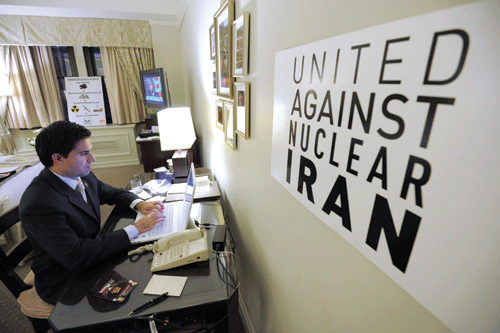"What else can go wrong?,” Lebanese bankers might ask these days as they flip through the news channels and jot down new additions to their “critical issues” list. When newscasts aren’t covering the civil war in neighboring Syria, commentators are wailing about volatile international markets and the European sovereign mess. What is more, record-low interest rates globally are limiting the range of investment options for Lebanon’s deposit-rich banks who are under intense international scrutiny, mainly spurred from Washington. Its all enough to keep a Lebanese bank manager up at night.
Tormenting their insomnia last month was the United States-based anti-Iranian lobby group, United Against Nuclear Iran (UANI), which publicly accused Banque du Liban (BDL), Lebanon’s central bank, and the country’s private banking sector of laundering massive amounts of cash for Hezbollah, Iran and Syria. “The LBS [Lebanese Banking System] is a fraud” and “the focal point of the fraudulent Lebanese banking centers on BDL,” were among UANI’s quotes in major international news outlets. As part of this campaign, UANI is pressuring Wall Street and European financial firms to divest of their holdings in Lebanese sovereign debt, requesting that credit rating agencies re-rate Lebanese debt to “no-rating,” and calling for Lebanon to be cut off from the US financial system, which would cripple the country’s highly dollarized economy. UANI is not inept either, having successfully lobbied the European Union to oblige Belgium’s Society of Worldwide Interbank Financial Telecommunication (Swift) to remove blacklisted Iranian banks from its network and thus restrain their worldwide financial transfers.
UANI’s board just so happens to feature Zionist luminaries such as Meir Dagan, former director of Mossad until 2011, as well as James Woosley, former director of the US Central Intelligence Agency, August Hanning, former head of the German intelligence service, and Richard Dearlove, former head of the British MI6 intelligence service. Fancy that.
The evidence supporting UANI’s claim that “vast inflows of deposits” are being washed in Lebanese banks is scant, with the group’s conclusions extrapolated from tenuous correlations that would amount to libel in any American court. The actual deposit figures — calculated by BDL, Lebanon’s Ministry of Finance and concurrent with those of international institutions such as the World Bank and International Monetary Fund — paint a different picture. In 2011, deposits grew by just 8 percent, down from a 12 percent growth in 2010 and 23 percent in 2009, and for the first four months of this year, deposits grew by just 3 percent. In response to UANI’s allegation, BDL Governor Riad Salameh pointed out that Syrian deposits held by Lebanese banks operating in Syria or in Lebanon have actually decreased since the start of the uprising in 2011.
UANI also claims that, for Lebanon, “the obvious risk of default is great” unless Hezbollah, Iran and Syria are supporting the “economic house of cards.” Had these ‘intelligence’ chiefs bothered to pick up a copy of Executive from time-to-time, they would have known better. For starters, default is less likely now then it has been in a while, as Lebanon’s debt-to-gross domestic product ratio, while still staggeringly high at well over 130 percent, has actually dropped more than 30 percent in the last five years. More importantly, the vast majority of Lebanese sovereign debt is held by local banks and not international institutions, and thus UANI’s call for foreign divestment of Lebanese debt has more bark than bite. Lebanese banks have admittedly voiced concerns about continuing to fund the highly indebted nation but, lacking better investment opportunities in international markets, sovereign paper still looks attractive, as does keeping the government from default. And, whenever there has been any uncomfortable up-ticks in yields demanded by the market to purchase Lebanese debt, the central bank has stepped in instead and bought the debt at lower rates — not Iran, Syria, nor any other state or non-state actor.
UANI’s indictments against Lebanon are baseless and its assessment of the country’s vulnerabilities flawed. It is unfortunate that these well-placed propagandists will likely never have to account for their deception, while Lebanon’s bankers are forced to defend their industry from yet another assault on its reputation. Given everything else they are dealing with these days, however, UANI is a speed bump rather than a roadblock, an annoyance amongst matters of actual substance.
MAYA SIOUFI is Executive's banking and finance editor









